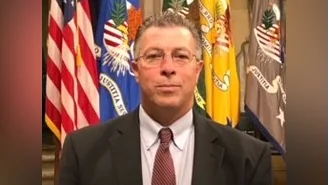The Congressional Record is a unique source of public documentation. It started in 1873, documenting nearly all the major and minor policies being discussed and debated.
“Information Sharing (Executive Session)” mentioning Chuck Grassley was published in the Senate section on page S1515 on March 15.
Of the 100 senators in 117th Congress, 24 percent were women, and 76 percent were men, according to the Biographical Directory of the United States Congress.
Senators' salaries are historically higher than the median US income.
The publication is reproduced in full below:
Information Sharing
Mr. GRASSLEY. Madam President, today, I am going to discuss a very important issue that I started to investigate during the last Congress, and it is an issue that the executive branch must continue to improve upon. The subject is information sharing between the intelligence community and the Department of Health and Human Services. The connection between those two entities is a critical information sharing data point, and it must last beyond the current pandemic.
To state the obvious, the healthcare landscape has evolved considerably in the past several decades. More specifically, the healthcare landscape has changed considerably in just the last year because of the COVID pandemic. Threats to healthcare now include cyber, intelligence, and counterintelligence threats.
For example, we know the Chinese Government engaged in cyber attacks to steal American COVID-related research. The Communist Chinese Government will stop at nothing to steal our hard-earned work product. They know, as does the world, that the best of the best is still right here in America.
Last Congress, as chairman of the Finance Committee, I focused a good deal of my oversight efforts on the Department of Health and Human Services' Office of National Security. For example, in June of 2019, I held a hearing on foreign threats to taxpayer-funded research, where the Office of National Security was one of the government witnesses. After the hearing, I then held a classified committee briefing with all the government witnesses to further discuss the foreign threats that we face.
That office is the Department's connection, then, to the intelligence community and, accordingly, it plays a critical role in the Department of HHS's overall mission. That mission includes pandemic response and countering national security threats
To fully perform its function, HHS needs access to intelligence community products and databases. So with that access, they would have information that is vital to mitigating threats to the Department, its funded partners, and its interagency colleagues. So, as part of my oversight efforts and before the pandemic even started, I worked to get that process done.
I noted my concerns to the Trump administration that the Office of National Security hadn't been adequately incorporated into the intelligence community. To their credit, the Trump administration rightly and quickly resolved many of these issues. The Trump administration created links and information sharing between the intelligence community and the Department of Health and Human Services where that cooperation hadn't existed before.
Those links should have existed many years ago, but prior administrations, like the Obama-Biden administration, failed to see around the corner and get the job done. Just as an example, even with the swine flu and outbreaks across the globe, the Obama-Biden administration failed to plug the Department of Health and Human Services into the intelligence community the way that it should have been done. The current pandemic exemplifies the need to have a robust intelligence operation that includes the Department of Health and Human Services.
As pathogenic threats to our homeland and our people increase and become more complex, the Federal Government must prepare well in advance for a very quick response. In order to accomplish that task, the government must focus on the seamless communication that must exist between and among the various Departments and Agencies. The Federal Government must take a whole-of-government approach.
One serious barrier to that seamless communication is overclassification. That is a serious barrier we find too much in government. But, particularly when it deals with the pandemic, it becomes a problem that can cost a lot of lives.
In January of 2020 when reports began to circulate about COVID, I instructed my oversight and investigative staff to get a classified briefing from the Office of National Security. After that briefing, I made clear in a public way that overclassification during a public health emergency could have deadly consequences.
If a certain intelligence work product is classified in a certain way, sometimes other government Agencies won't then have access. The Federal Government must guard against this type of overclassification, and that is especially important during emergency situations that demand quick action.
To the extent that disagreements exist between Agencies, which they often do in complex and ever-changing fact patterns, discussion must be had between and among the government. From that, the facts will bear out, and the best decisions can then be made. That process can't take place if the government puts information in silos that Federal health Agencies are unable to access.
Overclassification is more of a problem when China's Government refuses to share relevant data with researchers. At least this government--the United States Government--can and should share information between and among its Agencies.
This administration must advance and improve upon the cooperative gains created by the Trump administration and make sure that the left hand continues to communicate with the right hand. The last thing that we should do is to revert to the lack of cooperation that existed before, especially in light of the current pandemic and the lessons that have been learned from this pandemic.
The cooperation between Federal health Agencies and the intelligence community will strengthen ties between them for decades to come, and the American people will be better served by the increased communication. Simply put, increased communication will save lives.





 Alerts Sign-up
Alerts Sign-up